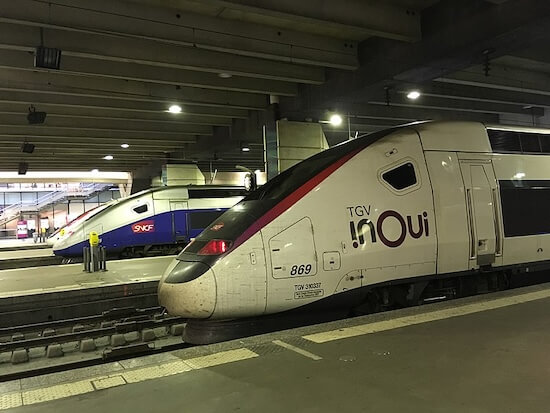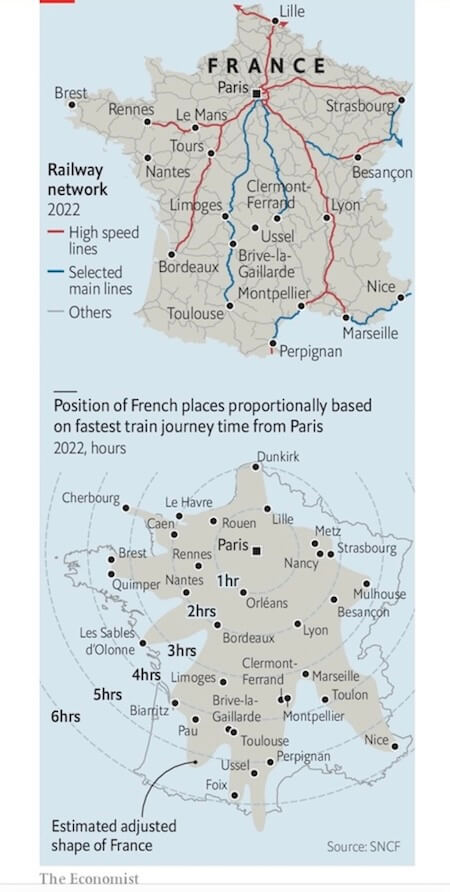
This week the UK Prime Minister announced that HS2, the high(er) speed rail line meant to cut the journey time from London to Manchester by 20 minutes, was effectively being cancelled. Some £25bn has already been spent on this, and with a further £36bn due to be spent to complete the phase to Manchester, it has now been cut, some 14 years after it was initially conceived and three years after construction began. Scrapped, done with, £25m and 14 years wasted.
The news coverage of this in the UK seems remarkably insular, focussed purely on what has happened in the UK. Whilst this is understandable, I am a proponent of lateral learning (see this earlier blog, “Lateral learning and Feldenkrais“), so once again I encourage those who seek to learn from this demoralising experience by looking at parallels we can potentially learn from.
One such example is within the UK, and it is the Eurostar iteration of the French high-speed trains simply called “TGV”. The fastest UK trains run at 125mph, limited primarily by the quality of our rail line infrastructure. The Eurostar and TGV trains run (in France) at 200mph.
Last week I was on holiday in France. In addition to travelling there by Eurostar, I also took the TGV from Paris to Metz. Here are some comparison points to HS2:
- Paris to Metz takes one hour twenty-four minutes at a speed of up to 200mph, a distance of 205 miles. London to Manchester currently takes two hours and eleven minutes to cover 199 miles, the (now abandoned) HS2 would have only taken this down to around one hour and fifty minutes
- My round trip first class ticket booked around two weeks in advance was £85. This week I just booked a round trip second class fare on the Manchester route at £103.40 for an off-peak return.
- Oh, and TGV trains are double-deck trains and are almost silent inside (a joy for someone like me with tinnitus).
The comparison is stark, the image below more so, showing how TGV lines have brought so many cities in France closer to the hub that is Paris.

To make just one city comparison from that map, the train from Paris to Bordeaux, around the same distance as London to Edinburgh, takes 2hr 9min by TGV, versus 4hr 16min for London to Edinburgh. The French government has recently banned all short-haul flights of less than 2.5 hours, so you can no longer fly between those cities. In the UK, by comparison, I end up flying that route far more often than taking the train, as a) the trains are normally fully booked (there is limited capacity, again due to rail infrastructure reasons, b) the overall time is quite a bit longer, and c) flights are less expensive. I wish for a world where that rail journey takes just over two hours, imagine how that would connect those two cities!
So, what can we learn from France on this and potentially apply?
Perhaps it is that when they focus on “grand projets”, the French can transform things and fast. They did it when they took the parlous state of Frane Telecom in the ’70s and ’80s and transformed that, they did it with the building projects of Francois Mitterand in the 80s (literally called the “grand projets”), and they did it with their move to nuclear power stations, and they did it with the TGV.
Could Britain choose to focus on leveraging our own abilities in areas such as engineering and industry to make our own “grand projects” happen? This isn’t really a choice, we simply must if we are to play our part in the world economy of the future as well as the pace of change needed to do what humanity can to address the climate crisis. We must think longer term and we must think big and brave.
I asked my friend Steve Moore about this recently and he noted this group who seem to be beginning conversation along the right lines. Am now following Britain Remade with some interest, not least because they seem to be a) thinking long-term and b) not to be playing politics on party lines.
What else could we learn from the failure of HS2?
